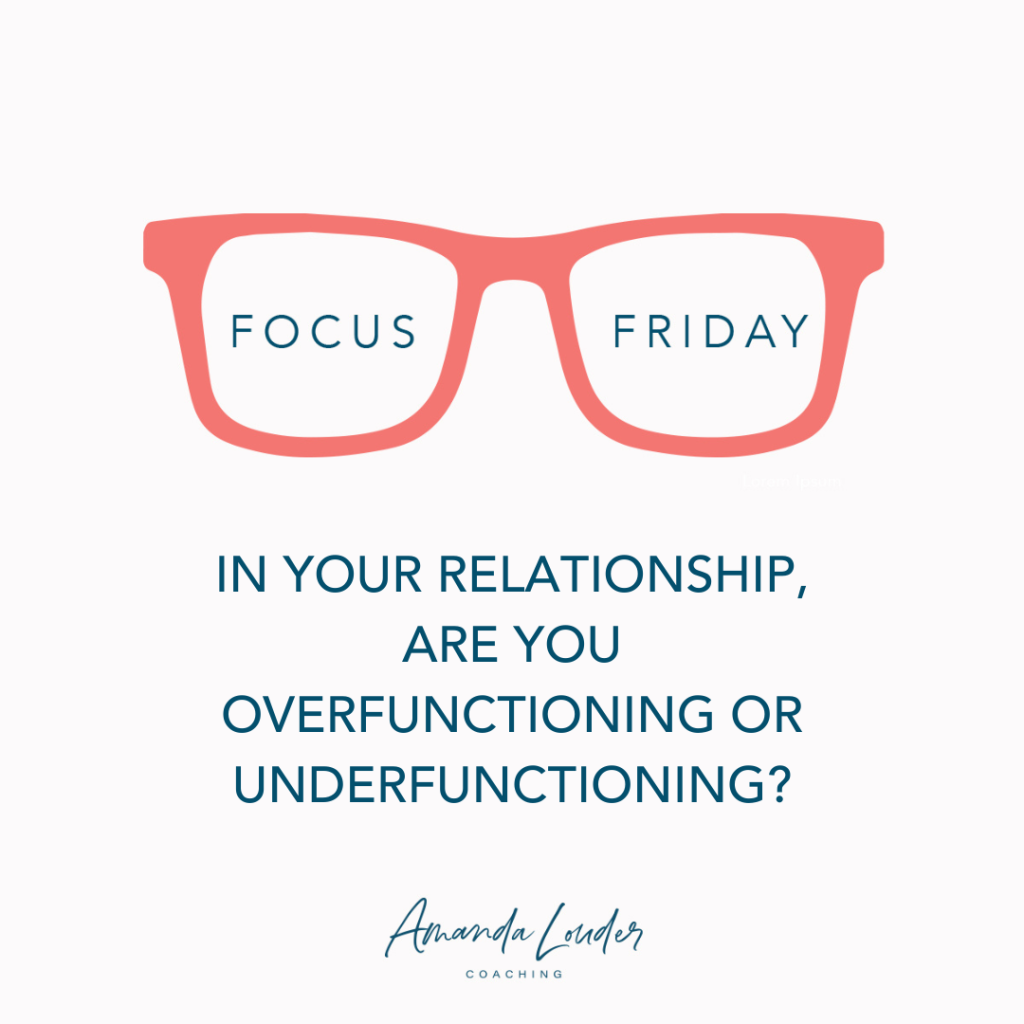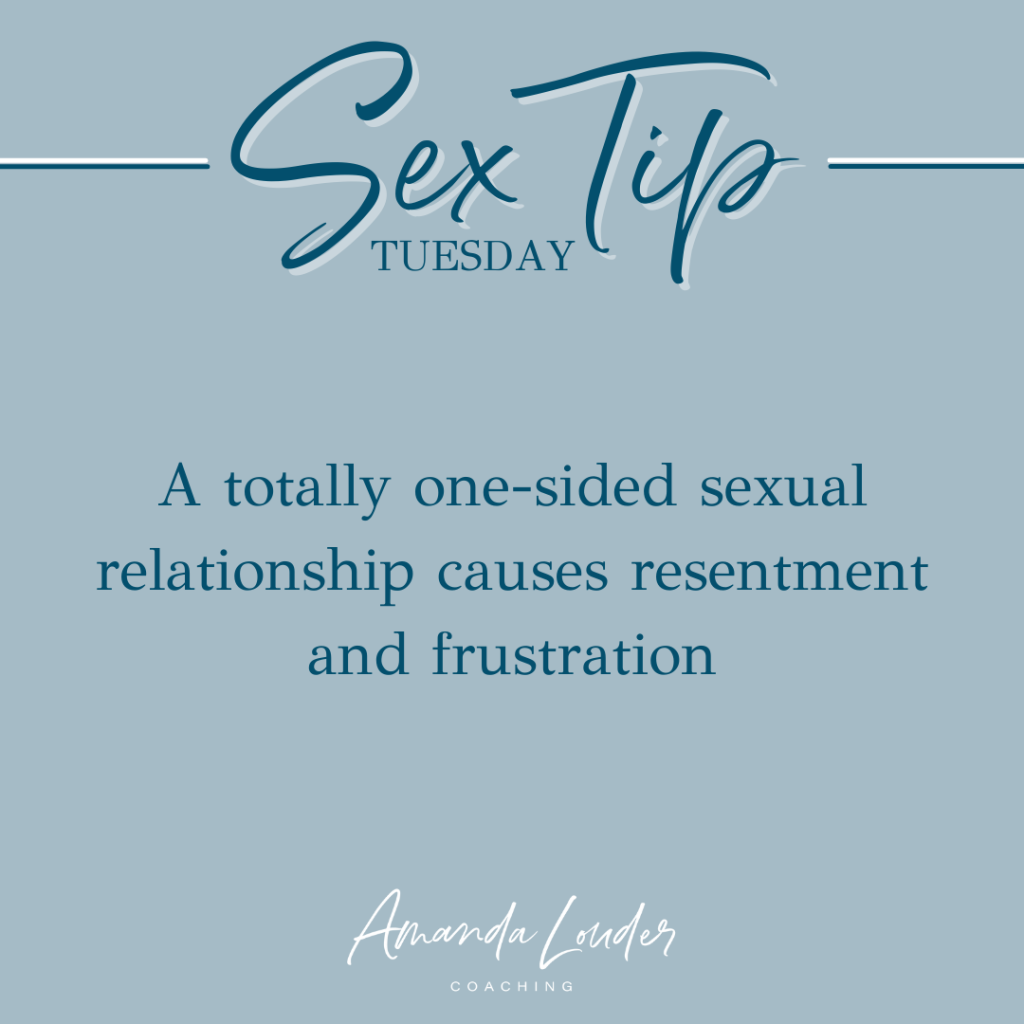
Let me ask you a question. Are you overfunctioning or underfunctioning in your sexual relationship with your spouse? Taking a look at yourself and honestly answering this question can help you have a better relationship. We often get into patterns and dynamics that seem helpful but end up causing more problems in the end. So let’s define what it is and what we can do about it.
Show Notes:
Follow Amanda on Facebook and Instagram.
Join Amanda’s Private Facebook Group.
Show Summary:
In marriages, we often get into patterns, dynamics, and ways of doing things that while they seem helpful at first, end up causing more problems in the end. Today we are going to be talking about overfunctioning and underfunctioning in the marriage and sexual relationships. This is a dynamic I see often and want to shed light on so that you can start to see how you over or under function in different aspects of your marriage and sexual relationship. And once you have awareness around it, then it’s a lot easier to change.
Let’s first define what over and under functioning are.
Overfunctioning in a marriage refers to a pattern of behavior where one partner takes on an excessive amount of responsibility, control, or effort in order to compensate for the underfunctioning or perceived shortcomings or lack of engagement from the other partner. People overfunction for a variety of reasons but the biggest ones are:
- Insecure attachment styles: Individuals with anxious or codependent attachment styles may feel compelled to overfunction in an attempt to maintain closeness and security in the relationship.
- Fear of abandonment or rejection: The overfunctioning partner may worry that if they don’t assume control and responsibility, their spouse will disengage or even leave the relationship.
- Childhood experiences and family dynamics: Past experiences or family patterns can shape behaviors in adulthood. Overfunctioning may be a learned behavior or a result of growing up in an environment where one person shouldered most of the responsibilities.
- Low self-esteem: Overfunctioning can be driven by a need for external validation and a fear of not being worthy or lovable without constantly proving oneself through caretaking behaviors.
- Overcompensation: They feel forced to overfunction because their partner is underfunctioning.
Underfunctioning in a marriage refers to a pattern of behavior where one partner consistently avoids or neglects their share of responsibilities, decision-making, and active engagement in the relationship. It often involves a lack of initiative, contribution, and investment in maintaining the relationship or addressing its needs.
Characteristics of Underfunctioning in a Marriage:
- Lack of initiative: The underfunctioning partner shows little motivation or willingness to take responsibility for tasks, decision-making, or problem-solving.
- Avoidance of responsibilities: The underfunctioning partner frequently avoids or neglects their share of household chores, financial obligations, emotional support, or sexuality leaving the burden to their spouse.
- Passive or dependent behavior: The underfunctioning partner may rely heavily on their spouse to make decisions, solve problems, or take care of the responsibilities, without actively participating in the relationship.
- Lack of engagement: The underfunctioning partner shows disinterest or detachment in the relationship, often failing to invest time, effort, or emotional energy in nurturing the partnership or sexual relationship.
- Emotional and physical withdrawal: The underfunctioning partner may exhibit withdrawal behaviors, such as emotional distancing, lack of affection, or decreased intimacy, leading to a sense of emotional disconnection between both partners.
People underfunction for a variety of reasons including:
- Learned behavior: The underfunctioning partner may have learned to rely on others to meet their needs or take responsibility in their family of origin, perpetuating a similar dynamic in their marriage.
- Fear of failure or inadequacy: The underfunctioning partner may harbor deep-seated fears of making mistakes, facing criticism, or feeling inadequate, leading them to avoid taking on responsibilities or making decisions.
- Lack of self-confidence: A lack of self-confidence or low self-esteem can contribute to the underfunctioning partner’s reluctance to take initiative or assert their needs within the relationship.
- Learned helplessness: The underfunctioning partner may have developed a sense of learned helplessness, where they believe they are incapable of effectively carrying out tasks or making decisions, leading to a reliance on their spouse. Sometimes this happens with a partner who over-functions.
We can see this over/under functioning dynamic in many areas within a marriage relationship including household chores and responsibilities, parenting, finances, spirituality, and of course sexually. And it isn’t always just one person who overfunctions in everything and one person who under functions in everything. A lot of times we over function in one area and underfunction in another area. If someone is consistently overfunctioning or underfunctioning in all areas then we might be looking at some mental health concerns like anxiety or depression.
So let’s look at overfunctioning and underfunctioning in the sexual realm. Most often what I see is that the higher desire partner is overfunctioning. They do all of the initiating, making plans, making it their job to try and satisfy their partners desires or “make them orgasm.” They are doing all of the work in the sexual relationship, which allows their partner to continue to underfunction. This, in and of itself, can cause strain on the relationship.
When a marriage and sexual relationship is so one-sided, what I typically see happen is that after years of overfunctioning the higher desire partner experiences a lot of resentment and frustration. They get tired from doing it all without reciprocity from their spouse. They see themselves as “the one who is right” and often don’t see how they have contributed to this dynamic and blame it all on their spouse. A lot of times when this happens they decide to stop overfunctioning, they stop initiating, and they stop making plans hoping that their underfunctioning spouse will step up, which doesn’t always happen. And then the resentment grows. They often feel helpless because it seems like no matter what they do, they don’t get what they want. They often don’t feel wanted or desired because their partner has never done that and it can affect their self worth. It can also feel very anxiety producing. Many times the overfunctioner does what they do to help calm and manage their anxieties. When that is gone, they often don’t know how to cope.
Underfunctioning in the sexual realm can be because of the typical factors that I listed above; learned behavior, fear of failure or inadequacy, lack of self-confidence, and learned helplessness. But there are also some other reasons that I think are worth mentioning.
- Hormone imbalance. While we would like to blame it all on hormones, I typically find that this isn’t true. But it’s always worth ruling out, just in case.
- Psychological factors: Stress, anxiety, depression, past trauma, or body image issues can affect sexual desire and intimacy.
- Relationship issues: Conflict, unresolved emotional issues, or lack of emotional connection in a relationship can contribute to diminished sexual desire, which is often seen as underfunctioning.
So we want to look at all of those factors as well as the overall relationship dynamics.
In the typical over/underfunctioning dynamic, the lower desire partner can be underfunctioning because they know that their spouse will take care of all of it. But because their partner is always the one to initiate and plan, they actually haven’t had the space to figure out for themselves how to actually want and desire. They have always been the one that is desired instead. And when their partner stops overfunctioning, for some it can feel like a breath of fresh air. They are finally allowed that space. For some they want space from sex and for others it creates space for desire to flourish. A lot of it depends on how they are thinking about it. But then there are others who feel a lot of pressure to step up, which creates more stress and they continue to underfunction.
So how do we fix this dynamic?
- Self-reflection and awareness: Both partners should reflect their own motivations and fears that drive their overfunctioning or underfunctioning behaviors and work towards developing a healthier sense of self-worth and self-care. Understanding underlying belief systems that are at play is also really important. For example: if one or both partners believe that the man should always initiate then it makes sense why that’s happening and how it’s contributing to their dynamic.
- Honest communication: Both partners should openly express their feelings, needs, and concerns related to the dynamic, fostering a safe space for dialogue.
- Making clear agreements and boundaries: Clearly define and communicate agreements regarding responsibilities, decision-making, and contribution within the relationship. (Notice how I’m not saying expectations. Expectations set you up for disappointment and resentment. But being able to collaborate and come to agreement between the two of you to create a win/win situation is important.)
- Encouraging shared responsibility: Work together to distribute tasks and responsibilities more evenly, allowing the underfunctioning partner to gradually take on more active participation and the overfunctioning partner to take on less. Doing this gradually will build confidence and trust.
- Building self-confidence: Support the underfunctioning partner in building self-confidence and self-esteem through positive reinforcement, encouragement, and reassurance.
All of the things that you need to fix this dynamic are built into my coaching programs for men, women, and couples. So check them out!





